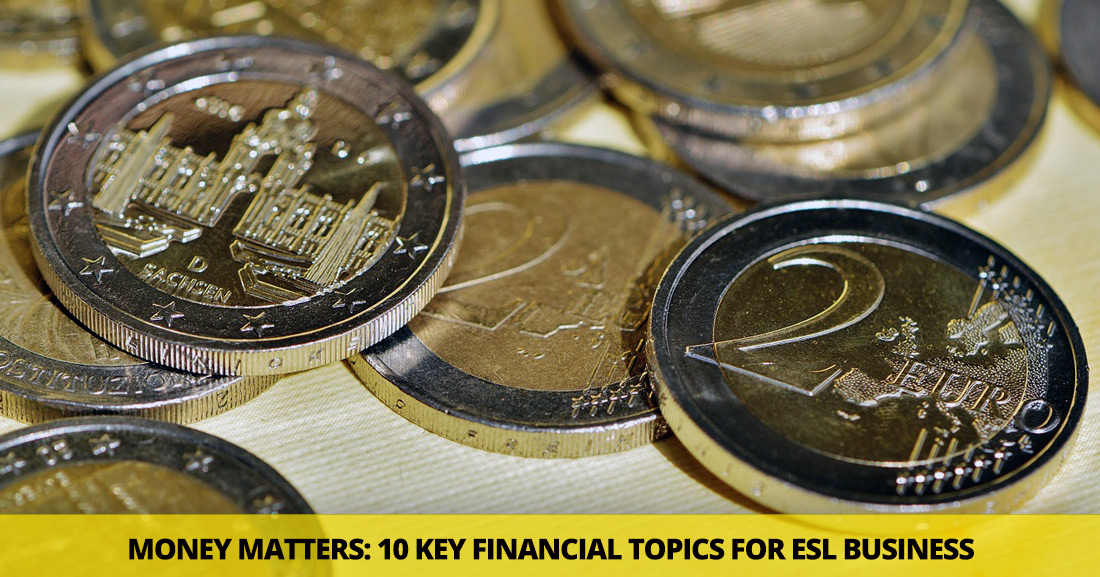
After teaching ESL for twelve years, I felt like a new challenge.
My school was struggling to hire ESL Business teachers, so I volunteered. I’m not trained in business or economics, but I found that a few hours’ research equipped me sufficiently to guide ESL students through the most important topics. Ultimately, it’s just another subject area, like the weather, or sports, or family life, and if you’re looking for a fresh challenge, I encourage you to give it a try.
The topic of money is central to any ESL Business course . Finance, borrowing, investing and banking all connect to almost every aspect of the business world, and the vocabulary and concepts they bring up will be useful throughout both our students’ education and their professional lives.
Given the choice, our students would probably prefer to talk about spending money rather than the mechanisms for making, exchanging or saving it. In fact, such topics as banking are among those considered the most dull, and so we need to address this preconception through some careful planning of the class material. In the business courses I’ve designed, I’ve tried to bring relevance to these topics, relating them to our students’ own lives and futures. I’d like to set out some of these ideas, starting with the vocabulary you’re likely to need for the basic concepts, and some methods for practicing it:
10 Key Financial Topics for ESL Business
-
1
Borrowing
Vocab: Interest (rate), Term, Capitalization, Credit, Loan/Lend, Collateral
Assign your students the task of borrowing a fictional $10,000, and have them research different methods of doing so, from a payday loan to a bank loan, refinancing a house, taking out a student loan, or even approaching a loan shark. Compare the interest rates of each, and have your students calculate the total sum to be repaid over the whole term of the loan. Which give the best deal? Are there any forms of loan which seem usurious or unfair? Which loans are the most common?
-
2
Credit Cards
Vocab: APR, expiry, gold/platinum (etc), bonuses/rewards, repayment, interest, credit score
Ask your students to go through the motions of applying for a credit card online (without, of course, pressing the ‘send’ button!) Compare the different deals available, the rewards they offer, and any discounts on balance transfers. Are any tied in with an airline, car rental company or hotel chain? Which offers the best deal, overall? What would happen if your students did not meet the minimum repayment terms? These days, what is a ‘good’ credit score?
-
3
Trading
Vocab: Currencies (and their names), commodities (with examples), shares / stocks, brokers, indexes (FTSE, Dow Jones, etc)
Ask your students to track recent changes in the price of certain commodities (oil, gold, etc) and account for these changes. What difference does it make to the world economy when the oil price changes? Can we trust the adverts which invite us to invest in gold because of its dependability?
-
4
Investing
Vocab: Risk, portfolio, hedge fund (manager), dividend, shares (of different types; preference shares, equity shares etc)
Your students could discover what is required to open a trading account with an online broker, and assess a few different brokers to find one which suits different (fictional) needs and investment philosophies. Which shares have been performing particularly well recently? If they had $10,000 to invest, would they buy a diverse portfolio, or focus on one area of the economy (energy, technology, airlines, etc)?
Add to this practice by consolidating the vocabulary with match-up exercises, sentence construction, error correction and, of course, plenty of relevant reading. Using the vocabulary as quickly as possible is the best way to learn it, and so ask your students to express advice on investments, banking and currency trading, for example, in spoken and written form.
Then, there are key financial concepts which are very useful for our students to understand. Prepare short, well-organized presentations on some of these, or make use of the many documentary films on these topics; whichever way you choose, keep the energy levels up and consistently engage your students with check questions to ensure their attention doesn’t waver:
-
5
The National Debt
Why do we have one? Why has it grown so much? How could the government pay it back? And, to whom does the government actually owe this debt? (Which brings us to…)
-
6
The Federal Reserve
How is the Reserve organized, and how was it formed? What is its primary purpose? (I’ll help with this one, because it’s probably not what you think; the chief aim of the Fed is actually to achieve a 100% employment rate in the US.) What controversies has the Fed been involved with? Who’s in charge of it at the moment?
-
7
The Personal Debt Crisis
How much does the average American owe in credit card, car loan, mortgage and student debt? Is this amount sustainable? What would happen if many people defaulted, as happened in 2008?
This could lead into a discussion of how so many people are in so much debt. Bring in such issues as the increased cost of going to college, rising house prices, and incentives to take out more loans such as 0% APR offers.
-
8
Inflation
Why do prices and salaries rise, year on year? What effect does this have? And how does ‘hyperinflation’ happen? (Take a look at Germany in the 1920s, and more recently Zimbabwe).
-
9
Payday Loan Scandals
Governments are starting to crack down on usury, the practice of knowingly loaning money at a very high rate, or with conditions which are almost impossible to satisfy. Where has this been happening? What compensation is being offered to those affected?
-
q
The LIBOR Scandal
This is probably for more advanced students, or those with an interest in banking. What are the basics of this scandal, and who was responsible? (A hint: the London Inter-Bank Offered Rate, which banks use to determine the cost of short-term loans to each other, was deliberately manipulated by traders. This led to criminal investigations and, in a rare victory for those concerned by the seeming impunity of bankers, actual jail time.)
Most people’s eyes glaze over when they hear the language of accounting and finance, but with some preparation, and a focus on the global issues which truly affect our students’ lives, money matters can be made engaging to almost any type of class.
P.S. If you enjoyed this article, please help spread it by clicking one of those sharing buttons below. And if you are interested in more, you should follow our Facebook page where we share more about creative, non-boring ways to teach English.








